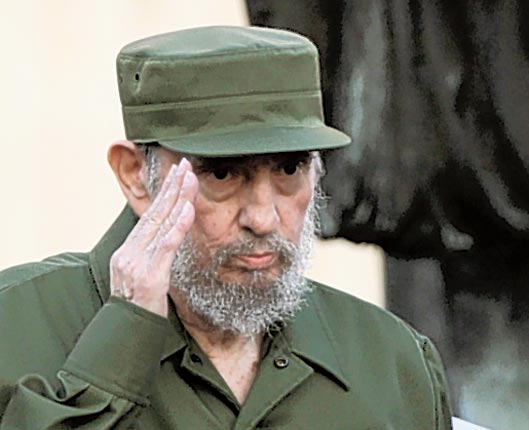Castro's return to full uniform sparks rumours

Fidel Castro dusted off his full military uniform for the first time since stepping down as president four years ago, a symbolic act in a communist country where little signals often carry enormous significance.
The revolutionary leader wore the olive-green cap and uniform — minus the star and laurels he held as commander in chief — at a speech yesterday to students at the University of Havana. The clothing choice was sure to revive speculation that the 84-year-old is seeking a larger role in Cuban politics after turning power over to his younger brother Raul.
Mr Castro repeated his warning that the world stands on the brink of a nuclear conflagration due to tension pitting the United States and Israel against Iran. He has returned to the message almost daily since emerging from seclusion in July.
But the 35-minute speech to thousands of students on and in front of the majestic stairway leading to the historic university was by far Mr Castro's most significant. Before, he has mostly spoken in closed sessions to small groups, and his appearances were usually not announced ahead of time.
Mr Castro, who began his political career as a student activist at the same university 60 years ago, said it has fallen to his tiny island to warn the world of the looming nuclear threat, and that it was important that it did not fail. "Faced with the sceptics, our duty is to keep up the fight," he said. "I am convinced that a good number of people are becoming conscious of the reality."
The former president has said he fears that fresh UN sanctions will give the US and Israel the right to intercept Iranian ships, which will lead to an armed confrontation that could go nuclear. At one point, he went so far as to warn that the conflict would break out before the later rounds of the World Cup soccer tournament in July, only to apologise for jumping the gun when hostilities did not materialise.
He thanked the university students for their support, saying he has always appreciated their backing. "In this, like in many battles of the past, we can win," he said of his efforts to warn the world of the nuclear danger.
Mr Castro stepped down, first temporarily, then permanently, in July 2006 after a serious illness that nearly killed him. He stayed almost entirely out of the public eye for four years while his 79-year-old brother, a close partner in the 1959 revolution, took the reins of power.
Since bursting back on the scene in July, the elder Castro has scrupulously avoided mention of domestic issues such as Cuba's economic woes or its fight against corruption, presumably to avoid stepping on Raul Castro's toes. He did the same on Friday, limiting himself to reminiscing about the past and warning about a nuclear future.
But Mr Castro's speeches have grown bigger, and he has crept closer and closer to at least looking like the revolutionary leader he once was. While he is no longer president, Fidel remains head of Cuba's Communist party. At yesterday's speech, he was introduced as Cuba's "historic leader" and "commander in chief".
Since taking over, Raul Castro has instituted limited economic reforms and tried to rid the government of corruption, but his unassuming style and reticence for public speaking are a marked contrast to his brother, who could hold the stage for hours in his heyday.
After wearing a loose-fitting track suit in several early appearances, Fidel caused a stir by donning an olive-green shirt at a 24 July ceremony outside Havana. Yesterday he looked the part of a revolutionary, decked out head-to-toe in his military uniform, with a simple military cap to shield him from the sun.
Join our commenting forum
Join thought-provoking conversations, follow other Independent readers and see their replies
Comments
Bookmark popover
Removed from bookmarks